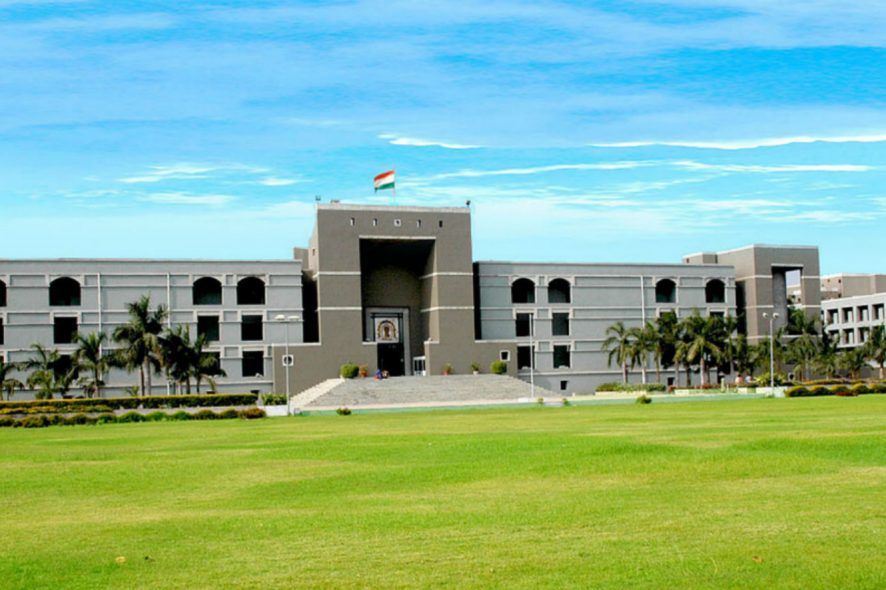Gujarat High Court: The Division Bench of Bela M. Trivedi and Bhargav D. Karia, JJ., dismissed a petition which was filed with the sole purpose of securing an appropriate order, direction and/or writ directing the authority to permit the petitioners and its members to perform Dokhmenashini/last rites in Dokhmas of its member having died due to Covid 19, in accordance with their religious practices which is duly protected by the Constitution of India.
It was the case of the petitioners that for the last more than 3000 years the Parsee community as per their religious mandate, laid out the deceased in a secluded place known as “Dakhmas” (the Tower of Silence). Respondent 1 had issued guidelines on 15-3-2020, namely “Covid-19 Guidelines on Dead Body Management”, whereby two modes i.e. either cremation or burial were identified for the disposal of the dead body, who died due to Covid-19.
As regards the religious practices of “Dokhmenashini”, it has been stated that the Parsees across India since several centuries have practised “Dokhmenashini”, wherein the dead body is kept at a height in a structure known as “Well/Tower of Silence” to be eaten by vultures and the remains being exposed to the Sun to be decomposed. The well is situated at secluded place and would be accessible to “Nasheshalars”, who handle the dead body and place it in the well. Most of the Parsees prefer Dokhmenashini for the final disposal of their dead bodies following their religious faith, however, on account of the Covid-19 Guidelines for the management of dead bodies, the Parsees are not allowed to perform their last rites Dokhmenashini as per their religious faith.
Counsel for the petitioner, Mr Asim Pandya along with Mr Manan Bhatt submitted that Dokhmenashini is an integral part of the religious practices of the Parsee community, who are in a very miniscule minority, and that it is their fundamental right to practice their religion in accordance with their faith and belief. He further submitted that under the pretext of the impugned guidelines on Dead Body management during the Covid-19 Pandemic, the Parsees are deprived from practising their religion by not permitting the Dokhmenashini, which action is violative of the fundamental rights guaranteed to the Parsees under Articles 14, 19,21, 25, 26, and 29 of the Constitution.
Sr. Advocate Mr.Perci Kavina, who belongs to the Parsee community, was incidentally present during the course of hearing through the video conferencing and with the permission of the Court, he sought to put forth certain facts. He submitted that since last 100 years, the means of disposal of dead bodies of the Parsees is burial only. He further elaborated that the burial is neither unknown to the Parsees, nor it is considered anathematic or sacrilegious to be buried.
Advocate General Mr Kamal Trivedi for the respondent-State, ASG Mr Devang Vyas for the respondent Central Government and the Advocate Mr Dhaval Nanavati for the respondent Corporation, submitted that said guidelines were issued in the larger interest of the public to ensure that the Covid-19 Pandemic was not further spread, and the Court may not entertain such petition.
The Court clarified that it does not undertake to decide an issue unless it is a living issue. The Court explained that the impugned guidelines have been issued by the Ministry of the Health and Family Welfare Department in the wake of Covid-19 Pandemic on the management of dead bodies, in order to prevent the further spread or covid related infection. Such guidelines issued in the larger public interest considering extraordinary circumstances prevailing in the country, would take precedence over the individual interest as also over the religious faith and belief of a particular class of community.
The safety and the welfare of the State is the supreme law as comprehended in the legal maxim – “salus populi suprema lex”. Even the fundamental rights to profess, practice or propagate religion, and the right to manage religious affairs, as enshrined under Articles 25 and 26 of the Constitution of India, are subject to public order, morality and health.
The Court quoted part of the latest Supreme Courts ruling in Suo Moto case relating to holding of annual Kanwar Yatra amid Covid-19 Pandemic dated 16-07-2021 where it was held that “The health of the citizenry of India and their right to “life” are paramount. All other sentiments, albeit religious, are subservient to this most basic fundamental right”.
The Court while dismissing the petition went on to hold that impugned Guidelines issued by the Ministry of Health and Family Welfare considering the prevailing situation of Covid-19, in the larger public interest for the disposal of dead bodies by cremation or burial, could not be said to be violative of any fundamental rights of the Parsees, more particularly when such means of disposal of dead bodies is also in vogue in all parts of the country and when it is not anathematic and sacrilegious to the religious practices being followed by the Parsees.[Surat Parsi Panchayat Board v. Union of India, R/Special Civil Application No. 7585 of 2021, decided on 23-07-2021]
Suchita Shukla, Editorial Assistant has reported this brief.






